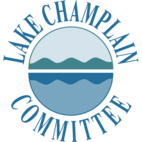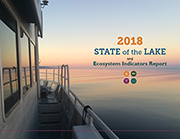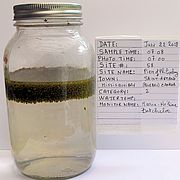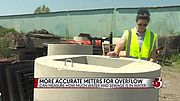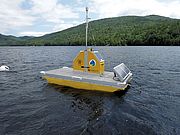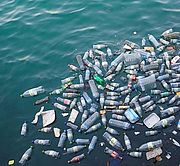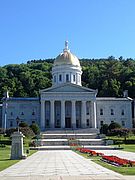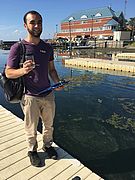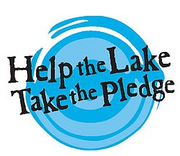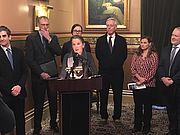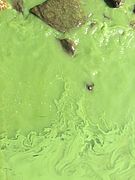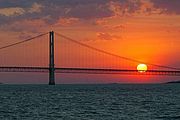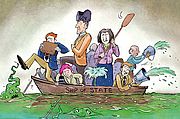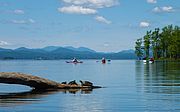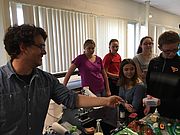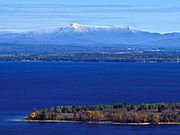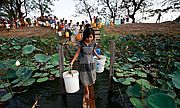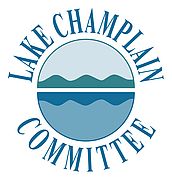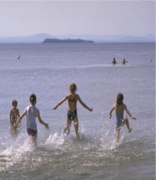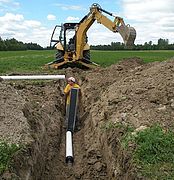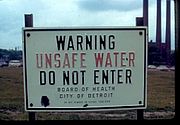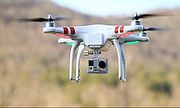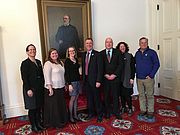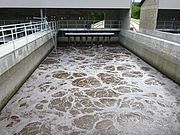From July 18 to August 16, a stretch of 29 days, the daily high temperature in Burlington, Vermont never fell below 80 degrees F. The streak eclipsed the previous record for consecutive days over 80 by four days. Keep in mind, the streak of hot days began AFTER temperatures climbed into the 90s for six straight days earlier in July. During that heat streak the region set another record, the highest ever daily low temperature of 80 degrees.
News from Selected Category
“This report helps the public to interpret information about the Lake using the best scientific data available. Lake managers use this information to develop and assess strategies for improving water quality in Lake Champlain,” said Dr. Eric Howe, LCBP Director. “In the 2018 report, we provide updated information on the many issues facing Lake Champlain.”
Stay up to date on water conditions on Lake Champlain and inland lakes with LCC’s weekly cyanobacteria reports. The report compiles and summarizes data collected from over 100 LCC monitoring sites in New York, Vermont and Quebec. It also includes helpful information on how to recognize and report cyanobacteria and actions to take to reduce bloom frequency.
WCAX TV - The city recently installed new meters in the combined-sewage overflow pipes. The meters will show not only how much water overflows but what percentage is sewage versus stormwater.
Seven Days - Founded in 2013, the Jefferson Project is turning Lake George into what it calls "the world's smartest lake," with the goal of better understanding, protecting and sustaining this crown jewel of the Adirondack region. The multimillion-dollar collaboration was named for Thomas Jefferson, who visited Lake George in 1791 and described it in a letter to his daughter as "without question, the most beautiful water I ever saw."
Avoid single-use items like plastic bottles, coffee cups and lids, cutlery, bags, plastic wrap, products with microbeads and microplastics and “free” gifts you don’t need. Read...
Vermont Legislators are deliberating on many measures that affect the health and future of our waterways. Let them know you want them to take action to protect and improve water quality. Updates on current bills and actions needed follow. Read...
We're gearing up for the summer monitoring season and are looking for people to report on water quality. LCC cyanobacteria monitors receive training to assess water conditions, visit the same site throughout the season and file a weekly online report from mid-June through the end of September.
Read...Protecting Lake Champlain's health is the shared responsibility of all of us who live in or visit the watershed.
Read...Vermont business, municipal, and environmental leaders came together in January to express shared support for long-term clean water funding via a parcel fee, and the establishment of a Clean Water Authority to collect and distribute those funds to on-the-ground clean water projects throughout the state. Groups endorsing the measure included the Lake Champlain Committee (LCC), Vermont Conservation Voters, Vermont Natural Resources Council, Lake Champlain Regional Chamber of Commerce, Pomerleau Real Estate, and the Vermont League of Cities and Towns.
Read...In late December 2017, New York Governor Andrew Cuomo announced a $65 million four-point initiative to aggressively combat harmful algal blooms (HABs) in Upstate New York waters. Twelve lakes that are vulnerable to HABs and are critical drinking water sources and vital tourism drivers were chosen as priority waterbodies. Lake Champlain and Lake George are two of the twelve that will receive greater focus. Lessons learned will be applied to other impacted waterbodies moving forward. Read...
President Trump's 2019 budget would again remove all EPA funding of cleanup programs for Lake Champlain, the Great Lakes, Chesapeake Bay, the Gulf of Mexico, Long Island Sound, San Francisco Bay, Puget Sound and South Florida, including the Everglades and Keys. Again, it's a short-sighted draconian move that will degrade freshwater resources and threaten public health and our economy. Read more here.
“It appears the Vermont legislature will join Gov. Phil Scott in delaying again any decision on how to raise millions in new revenue to pay for Vermont's billion-dollar cleanup of its waterways. Environmental advocates and federal regulators are looking on with increasing concern."
Read...Vermont officials' refusal to share their stormwater document leaves unanswered questions about how the state is — or isn’t — working toward its commitments on water quality. Read more in this Seven Days article that outlines the Lake Champlain Committee and VNRC’s request for answers. Read...
On average, synthetic fleece jackets release 1.7 grams of microfibers each wash, which equates to an average of 80,000 microfibers.
Read...As state legislatures struggle to take action on long-term funding for water protection and the Trump Administration proposes radical cuts to environmental programs, Doug Facey ponders the value of our lake. Doug is a longtime LCC member and professor of biology at St. Michael's College.
Read...LCC ECO AmeriCorps member and Education and Outreach Coordinator Dominic Brennan has spent several months conducting research and doing site visits at schools in New York and Vermont. The outreach is part of our School Stormwater Assessment Project funded through a grant from the Lake Champlain Basin Program.
Read...The Open Space Institute (OSI) recently announced acquisition of shoreline property on Lake Champlain to enhance recreational boating and mountaintop hiking opportunities while protecting local water quality. Easily seen from western Vermont and the city of Burlington, the property also offers views of Lake Champlain and the Green Mountains to the east, and the Adirondack High Peaks to the north and west. The property features more than 4,000 feet of Lake Champlain frontage and is also the scenic backdrop to Schuyler Island, a renowned day trip for area kayakers and boaters.
Read...Every month, Vermont's Clean Water Initiative Program highlights a "Clean Water Superstar", species that help keep waters swimmable, drinkable, and fishable. A past entry was the Raphanus sativux L, the oilseed radish. Since it's gardening season we thought we'd highlight its benefits in the excerpt below.
You don't have to be a fan of a radish's spicy crunch to reap the benefits of planting them in your garden. Although edible, oilseed, tillage, daikon, or forage radish is more commonly used as a cover crop.
How many people have access to clean and safe water? Where do they get it from and how much do they pay for it? A report by the World Health Organisation/Unicef Joint Monitoring Programme delves into data on drinking water from the last 17 years to give a detailed view of the state of access to drinking water today.
Read...Show your support for the vital role science plays in our health, safety, economies and governments by joining in the Earth Day March for Science.
Read...Come work for clean water! Want to protect Lake Champlain's health and accessibility? Have a passion for both policy and field work? Are you a persuasive communicator of scientific and technical information? Direct your skills and energy to protecting the health and accessibility of Lake Champlain as LCC's Director of Science & Water Programs.
Read...Dear Lake friends,
As someone who cares about clean water, are you willing to make one phone call? This week, the Vermont House will make key decisions about whether and how to address the $62.4 million annual investment needed to protect and restore our waterways. Please take a moment to call your legislators today and let them know you want them to invest in water clean-up now.
Read...The White House is proposing to slash the Environmental Protection Agency's (EPA) budget by 25%. The $2 billion cut from EPA's budget of $8.14 billion represents a mere .05% "savings" in the total federal budget.
Read...For several years LCC has been raising awareness about tile drains and urging state agencies to focus more attention and regulatory scrutiny on them.
Read...Dr. David Strayer, freshwater ecologist at the Cary Institute of Ecosystem Studies, shares his thoughts about why any efforts to repeal the EPA rule that defines waters of the United States (WOTUS) should be resisted, especially if you care about the health of our nation's lakes, rivers, streams and wetlands.
Read...The Lake Champlain Committee (LCC) and environmental consulting firm Arrowwood Environmental (AE) won a competitive grant from the Lake Champlain Basin Program to continue our aquatic invasive species mapping and control project.
Read...The Vermont Citizens Advisory Committee (VT CAC) presented its annual Action Plan to the Vermont Legislature last week in a day-long series of meetings at the Vermont State House.
Read...Every month, the Vermont's Clean Water Initiative Program highlights a " Clean Water Superstar", species that help keep waters swimmable, drinkable, and fishable.
Read...The Vermont Legislature returned on January 4 with new faces and some changes in leadership. Mitzi Johnson of South Hero was elected Speaker of the House of Representatives and Senator Tim Ashe, representing Chittenden County, was elected President Pro Tempore of the Vermont Senate. Congratulations to them and good news for the Lake Champlain Basin, as there are now two leaders that understand firsthand the environmental impacts of the phosphorus pollution on the lake and the surrounding waters.
Read...